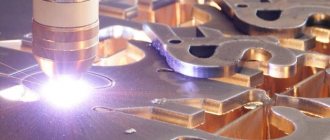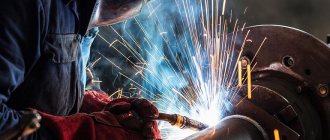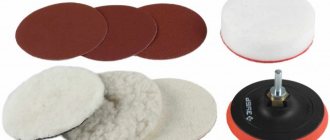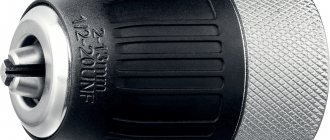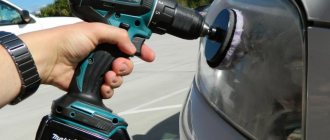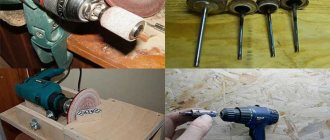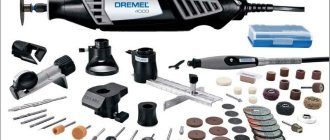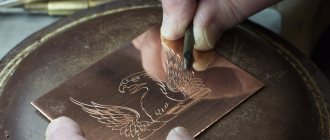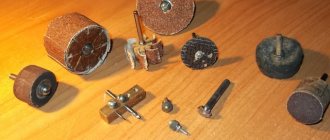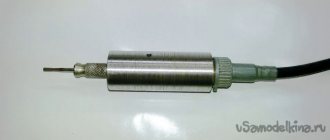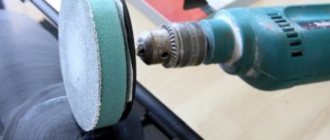If you have an electric drill in your home workshop, then the craftsman will have the opportunity to build devices that can simplify the work associated with repairing and manufacturing products. To turn the tool into a specialized unit, it is enough to buy a drill guide or make it yourself.
In any case, the problem of how to drill a hole at 90 degrees so that the product is neat and in presentation will disappear.
Drill Guide Features
The drill stand has several important characteristics:
- Vertical stroke (how far the tool can be moved vertically).
- The diameter of the fixing flange (determines what size tool can be clamped).
- Material.
- Size and weight of the device.
Drilling stands can be mobile or stationary. The stationary guides are very reminiscent of a small drill press, they look like a tripod for a drill. Mobile guides are attachments for drilling tools. Their main advantage is their very high mobility.
An important property of the rack is the method of fastening. The most reliable option is a magnetic mount. There is also a simpler option - this is a vacuum mount.
Mobile devices fit comfortably in your hands and absorb vibration when drilling. Most people choose mobile guides. All thanks to their excellent characteristics. They are very reliable, compact and have a low price.
The rating of the best models is represented by the following tools:
Tecmobit Wolfcraft
“Caliber 96302“. An excellent budget model. It has good quality and low price. The attachment consists of two chromed metal rods and a plastic base. The device also has a special device for fixing the tool. The caliber has proven itself to be an inexpensive and reliable tool.
Caliber 96302
The Chinese model “KWB 7784“ has long been a leader. The design of this device is similar to the Russian Caliber. Consumer opinion about it is mixed. Some consumers comment on the short service life of the device and its breakdowns. The height of the device is small, only 213 mm. It has a vertical stroke of 160 mm and a tool hole diameter of 43 mm. The weight of the device is a little more than a kilogram.
KWB brand products
Stand DIOLD SMS-43. It consists of a base, a column and a clamp for attaching an electric drill. The base has grooves for a vice. It has a height of 500 mm and a drill hole diameter of 43 mm.
Please note the following manufacturers:
- Dremel is a company that produces machines for drills. With their help you can drill at an angle, polish and grind materials.
- Sparta – Stationary racks. Important advantages are the high quality and smooth movement of the drill.
- Skrab – Often used at home and small workshops. An excellent device for its very modest price.
And these are only the most basic vertical devices for drills; besides them, there are many more well-known and not so well-known ones.
Devices in the form of a machine
Drill attachments are very popular, allowing you to use the device as a wood lathe. Such equipment is fixed on the work table, and the electric drill functions as its electric drive mechanism. When installing this console, a special support and fastening system are used for the drill design.
The multi-position drill holder is available in different design versions with different sets of cutting tools and devices, making it possible to easily and simply fulfill the dream of many home craftsmen - to have a lathe at their own disposal. Of course, the turning mechanism driven by an ordinary electric drill cannot compare with special equipment. If such a device is used actively, the electric drill cannot withstand significant and long-term loads and, as a result, will not turn on soon.
More well-known devices for drills are attachments, which make it possible to create an electric sanding mechanism. There are practically no problems with the design of the drill handle, including for inexperienced craftsmen.
Similar drill devices can be used:
- for sharpening knives and circular saws;
- to restore the geometric characteristics of drills, turning mills, bits and knives.
Required Parts
Any drill stand, regardless of its dimensions and taking into account the purpose of such devices, has basic structural elements, each of which performs its own functions and must meet certain requirements.
- The bed is one of the main components of the described equipment, which is its base (stand) and ensures the stability of the entire structure. In addition, a vice is located on the bed for fixing the workpieces being processed. The weight and dimensions of this element depend on the power of the tool used and the list of tasks performed.
- A guide post, which is positioned strictly vertically in relation to the base. Even with a slight deviation, the workpiece being processed can be damaged and the drill or cutter can be broken. Depending on the design features of a particular model, this part can be made of different materials.
- Movement mechanism. There are no strict requirements for the design of this node; templates are not applied. Its main task is to ensure smooth movement, secured with brackets or clamps of the drilling tool along the tripod. There are many variations of such mechanisms.
- Holder for equipment (drill, hammer drill, screwdriver). Clamps, blocks and other mounting elements are used as effective fastening.
Attachments, tools and accessories for electric drills
An electric drill is an indispensable tool that can be found in almost every home; it is more than a motor with a chuck and a comfortable handle. It is the drill chuck that is the device that allows you to use it with advanced functions. The only exceptions are stops designed to fix the drill and accurately set the position and direction of movement.
Classification of nozzles and devices
Additional accessories and attachments for the drill can be divided into several groups based on functionality.
Groups of attachments and accessories for drills:
- stops and clamps that allow you to accurately position the tool and limit the depth of the holes;
- stop attachments for forming holes at different angles and at precisely adjusted right angles;
- nozzles with cutting functions for metals, wood, plastics, and panel materials;
- polishing and grinding attachments, wheels, brushes, abrasive tools;
- whisks for mixing solutions, paints, plaster mixtures, adhesives;
- pumps driven by an electric drill.
This list may not include all categories of attachments and devices, since the choice is huge, and new devices appear constantly. They are produced not only by industrial enterprises, but also by craftsmen.
Stops, frames, guides, machines
In this category you can find several types of devices, the task of which is either to limit the displacement of the drill relative to the drilling axis, or to make its translational movement as precise as possible in direction.
The design of most stops consists of two guides, drill position clamps, a frame itself, or a socket for installing the tool.
The guides can be supplemented with return springs, which repel the tool in the absence of human effort. Some stops have worm-type movement and locking mechanisms designed to move the tool slowly or set it in a specific position.
Stops have two clearly divided categories - those fixed to the drill and those that fix the drill itself. The second ones, installed on a table or workbench, give the drill the function of a moving part, a carriage of a drilling or grinding machine. Craftsmen also manage to make lathes. These are very specific devices that are not always used in everyday practice of using a drill. Their acquisition must be clearly motivated - either you are a master who makes a certain profit from the tool, or you are a collector or a lover of metalwork and turning.
The cost of stops varies widely, since there are many options for their design, level of complexity and functionality. The simplest device in this class is a parallel stop, which limits the depth of penetration of the drill into the material. Fixed machines are the most expensive part of this section, designed for professional use.
Advanced Drills
The main task of an electric drill is to drill holes, and the range of tools for this is very wide. In addition to conventional sets and single drills, in this class of devices you can find and use:
- Forstner drill with a centering point and wide side cutting surfaces. The tool allows you to make holes of small and medium diameter in wood without going through the material. Thanks to the tip, this drill can make holes for installing hinges, very precisely located in relation to the edges of the board;
- Spade drills for working with wood allow you to make wide, up to 60 mm, holes for installing fittings in solid and slab materials. The centering point and wide side stays are designed for precise recess positioning and limited depth. Drills have a characteristic flat configuration;
- a crown attachment is a complex shaped tool for sampling material from solid wood and chipboard, fiberboard, concrete and metal. The robust, wide cutting surface with a distinctive profile works as a cutter or group of cutters that selects holes up to 100 mm in diameter. In the center of the nozzle there is a drill, which defines the first, centering hole and guides the entire nozzle;
- drills for wood, concrete, metal - a wide range of different configurations, including especially durable Pobedit drills for working with concrete. In this group you can also find attachments for vibration and impact machines, which are similar in functionality to hammer drills.
Regarding the cost and the need to have the tools from this list, we can say that the choice of options is very large. The most expensive in the category will be a complex attachment for making wide holes - this is a professional tool that is not suitable for every drill.
Drill bits - home or professional
Feather drills and Forstner tools belong to the semi-professional category - they can be purchased and kept in a set, but it is worth considering that such specific devices do not need to be used in everyday practice. They will be useful for those who like to work with furniture, carpentry specialists, and for assembling doors.
It’s worth having a set of regular and pobedit drills in your home all the time, and the more diameter options there are, the better. In an apartment with concrete walls it is extremely difficult to do without a Pobedit drill. Attachments for rotary hammers and impact drills are considered in two versions - professional for builders and repairmen with powerful rotary hammers, and for home use, designed to work with a drill with extended functionality.
Angle adapters for drilling in hard-to-reach places
In this group of devices, gearboxes are most often found - gear and friction units that change the angle of rotation through the use of an additional mechanism and its own drill chuck. These are a kind of extensions that are installed on the drill and hold the drill in its chuck, making it possible to get into tight places.
Here it is worth thinking about choosing a device according to your capabilities.
The best option would be a nozzle with a variable angle, almost universal, which costs a little more than a fixed one, but makes it possible to get anywhere. To use such a gearbox, you will need a drill with increased power and good torque, but for a person who does all the housework himself, the device can be a good helper.
Cutting attachments for electric drill
In this category you can find at least two design options and possibilities for using devices for an electric drill - classic scissors for working with sheet materials and so-called “crickets”, which allow you to make even cuts and drill wide holes.
Scissor attachment
The scissors work reliably with steel up to 3 mm thick; they can be used to cut polycarbonate sheets, aluminum profiles, plastic, and roofing materials. The nozzle is selected according to force, the range for selection is wide, and the tool can be adapted to a professional powerful drill and to a home machine.
In a private house or garage, such a device will not interfere with an amateur craftsman, because working with sheet materials is always relevant. Powerful scissors will require the purchase of a drill with the appropriate parameters.
Cricket attachment or nibblers
A professional device for working with sheet and roofing materials, capable of cutting sheet steel up to 1.5 mm thick, stainless steel up to 1.2 mm, plastic, aluminum and copper up to 2 mm. The main advantage of cricket-type cutting shears is the ability to accurately cut sheets and drill holes of medium and large diameters.
The tool is indispensable for roofers who value not only precision and accuracy, but also high speed of work. Using a cricket requires certain skills.
Is it worth buying or keeping such a device in your home workshop?
Only provided that you know how to use it, and the tool itself is of high quality and expensive. A low-quality cricket will not give a good cutting effect, and you will only need to use it from time to time. The cricket makes it possible to perform artistic cutting of sheet materials.
Polishing and grinding tools for electric drill
This category consists of two large sections - polishing and grinding tools. These tools can be different in shape, since they can be used for working on surfaces, processing holes and finishing seams. Depending on the purpose, the material of the tool is selected.
Polishing accessories
Made from felt, felt, wool and foam rubber, sandpaper. Designed to bring surfaces, holes and seams to their final smooth state, giving a shiny effect.
Professional tools include attachments for processing holes and polishing discs - the most expensive ones, which allow you to bring various holes, including in car body parts, to the technologically required state.
Nozzles of this type are selected according to their main purpose and size. For a home workshop, a polishing brush is sufficient for finishing surfaces and seams. It is worth purchasing brushes of three sizes and degrees of hardness in order to be able to process surfaces made of different materials. The most common polishing attachment is made from medium-hard felt.
Grinding Accessories
These nozzles vary in design and base material to:
- abrasive fiber discs mounted on a support plate;
- petal heads made of sandpaper;
- carbide cutters for working on particularly durable materials with high precision;
- grinding stones for processing edges, seams, holes;
- abrasive polymer brushes for removing dirt from the surface of metal, wood, stone and other materials.
You can notice that in the group of tools there are exclusively professional products - these are cutters made of special hard alloys (aka cutters) and rod grinding stones. Their use at the household level is practically pointless.
In your home workshop and garage, it is worth having a set of flap brushes and several nylon brushes, as well as abrasive wheels with several grain sizes. A very important detail - when purchasing such devices, we must not forget that they are subject to rapid wear. Their cost is usually low.
Whisk attachments
Always presented in a wide selection. These tools come in a variety of shapes and sizes, as they are designed for mixing dry, liquid and viscous mixtures. Whisks are usually inexpensive, but you should choose them taking into account the work ahead - you can break the nozzle if you apply it to an excessively viscous solution.
Tools with characteristic vertical parts are suitable for working with dry mixtures; spiral and complex nozzles are designed for mixing solutions of varying densities.
For large-scale construction work, only a drill with a whisk will not be enough; in this case, it is better to use a construction mixer.
Pump attachments for electric drills
This is the most specific group of devices - this nozzle can be used for pumping liquids and solutions, but provided that you have a powerful drill. The pump performance is selected according to the situation, so it is extremely difficult to talk about a specific application.
The price range in this group is very wide, because the pumps are produced by Russian, Chinese, and European manufacturers. It’s hard to say whether to buy a pump attachment for a drill for a home workshop. In a private home or country house, it may be needed in emergency situations, but we must not forget that the time of continuous operation of the drill motor is limited, and the pump will have to be stopped periodically.
At the end of the review, we must note that when choosing attachments, it is necessary to take into account the design, power and functionality of the drill, your own skills in handling the tool and the need to strictly observe safety measures!
Mechanism for moving the drill in the vertical direction
A homemade drilling machine must be equipped with a mechanism that will ensure the movement of the drill in the vertical direction. The structural elements of such a unit are:
- a handle with which the carriage with a drill attached to it is brought to the surface of the workpiece;
- a spring necessary to return the carriage with the drill to its original position.
Spring mechanism for moving the drill
You can make such a mechanism using two design schemes:
- the spring is connected directly to the handle of the machine;
- the springs are located at the bottom of the carriage - in special grooves.
According to the first option, the design is carried out according to the following scheme:
- two metal plates are fixed on the machine stand using screws, between which an axis is installed, where the installation handle will be placed;
- on the other side of the rack, plates and an axis are also installed, on which one end of the spring is fixed, and its second end is connected to the handle;
- the pin with which the handle is connected to the installation carriage is placed in a longitudinal groove made in it.
The basis was an old stand from a Crocus photo enlarger made in Poland
If the springs are located at the bottom of the return mechanism, then the handle of the device is also fixed using two plates and an axis that ensures its movement. With this design, the springs are located in the lower part of the guide grooves, which are modified using metal corners that limit their movement.
The principle of operation of a drilling machine, in which the springs are located at the bottom of the carriage, is quite simple: moving down during the drilling process, the carriage with the drill attached to it presses on the springs, compressing them; after the mechanical impact on the springs stops, they unclench, lifting the carriage and drill to their original position.
Drill holder - what is it?
The drill can be used as a grinder, sharpening machine, or router. In all cases, it is necessary to fix the tool on the workbench. Considering the complex shape of the case, simply pulling the drill to the table will not work; the spindle axis will not be parallel to the working surface. The manufacturer has provided a special recess - a neck on the body.
Its main purpose is to attach the second handle. And since the neck of the drill is a power element of the structure, it can be used as an attachment point.
The holder for the drill is a clamp (as a base), a clamp is attached to it, in which the neck is clamped.
- fixed clamp – the tool is positioned motionless and parallel to the table
- rotary clamp allows you to rotate the tool around a vertical axis
- The holder with two degrees of freedom adjusts both the horizontal and vertical angle of position.
Important!
The typical diameter of the clamp is designed for a neck of 43-46 mm. Before purchasing a device, check the dimensions of your tool. There are also unique devices that have an unlimited degree of freedom. However, the cost of such devices may exceed the price of the instrument itself.
You can make a simple holder yourself. Typically this is a horizontal stop with two attachment points.
The main (power) clamp for clamping the neck, and the rear bracket for giving the drill axis a horizontal position.
Features of self-production
When designing a conductor for confirmation, it is necessary to correctly calculate what functions it will have to perform in the future. It should be done for the most commonly used fasteners in the house. If such a device is required by furniture makers for constant work, then it is better to buy a factory model, which is distinguished by great precision. In addition, manufacturers often include additional fasteners, stops and templates in the kit.
The price of such a device for professional use ranges from 400 to 1100 rubles. It depends on the immediate capabilities of a particular unit, the number of holes made, their length, etc. Many people are interested in how to make a furniture jig with their own hands. Drawings with dimensions are a must for novice craftsmen, as they allow you to make a high-quality design on the first try. Similar diagrams can be found on the Internet.
Basically, the conductor has the following elements:
- The basis of the product. It is directly applied to the plane of the furniture, on which the holes will be drilled.
- Guide bushings. A drill goes through them.
- Surface clamping parts. As a rule, they are located at the end of the conductor.
Next you need to take care of the correct direction of the sleeve. It can be made from stainless pipe. The length of the sleeve should be at least twice as long as the hole in which it will be located on the angle. The bushing should fit tightly in the hole. The simplest and most common option is a shaft-type landing. A corresponding hole is drilled in the corner to fit the already known diameter of the bushing, and then the fit is made. It is recommended to use a low interference fit.
There are cases when the jig needs to be made for drilling deep holes. Then the bushing is made with a collar. The number of possible holes, their length and the distance between them is selected to suit the specific needs of each master.
Several options can be used to attach the device:
- Spring support. The conductor will adhere to the material being processed using spring force. For these purposes, you can use any flat spring with the required force.
- Fastening to wood using self-tapping screws. Using this method, the jig is pressed and held on the working surface due to friction. This fastening method allows you to use the resulting marks for subsequent centering of the part. When working with chipboard, you need to use this method with great care.
- Clamps with rubber gaskets. This method is dangerous due to possible displacement of the bushing axis. This happens because the weight of the jig increases and the bushings become bent. Therefore, you must first attach the jig to the surface, mark the future hole, and then start drilling.
Mixer - attachment for mixing paints
Another popular device is the mixer attachment for a drill. We're not talking about food processors. Although, by attaching a hand whisk or pepper mill to the cartridge, you can mechanize the tedious process.
Using various attachments, construction mixtures and technical compositions are mixed. This is a simple device, however, you cannot make it yourself.
When choosing a mixer attachment, you should consider the power of the drill. During stirring, a lot of force is applied to the mixer axis. The motor is designed for a certain torque; if the load increases, the windings may burn out.
Popular: Should you choose an impact drill or a hammer drill?
Making a machine tripod
The machine will consist of the following parts:
- Bottom part;
- metal vertical guides;
- upper part with cartridge.
Bottom part
It is a board or thick plywood in which we drill two holes for the guides. These holes should be slightly larger in diameter than the guides so that in the future they can be set exactly at 90 degrees.
Metal vertical guides
They are two rods of the same size. They are attached to the bottom of the product using cold welding or epoxy resin.
In order to set them straight at an angle of 90 degrees, you can use a regular wooden block, in which the cuts on both sides should also be straight.
After the glue has completely dried, we make the upper part.
Upper part with chuck
It is made from a bar as follows. We accurately measure three holes on the block, two at the edges, they will be through and one in the center. In the central hole, the depth on both sides will be equal to the width of the bearings, which will be glued with the same glue to the axis of the chuck and the central hole of the upper part of the machine.
We install bushings in the side holes that will move freely along the metal guides, but there should be no play. The bushings must be selected exactly according to the diameter of the guides.
We also glue these bushings so that they are tightly secured and do not fly out.
We take the cartridge and glue the guide to its axis.
We put the guide on the cartridge axis and remove excess glue. The guide should also fit tightly onto the chuck axis. We get the following.
We install a bearing of a pre-selected size on the cartridge tube.
We coat it with glue and install it in the central hole of the upper part of the machine.
On the other side we do the same thing, install the second bearing.
As you can see, the tube is clamped in the cartridge. Instead, you can clamp a drill. It is needed in order to subsequently install the cartridge at an angle of 90 degrees relative to the bottom of the product.
After installing the cartridge and the glue has dried, remove the upper part of the product from the guides and place springs and washers on the metal rods.
Springs can be purchased at any hardware store. Then we put on the top.
You can install plugs on the vertical rods. We cut a hole in the bottom of the product for ease of drilling.
It turns out like this.
Checking the product for accuracy and quality of work
Installs a drill, drills a hole
insert a metal rod or drill of a suitable diameter into it.
We measure with a corner to make a right angle after drilling.
Our expectations and efforts were justified. The machine works accurately. Can be used when performing work.
Result of work
If you liked my article, give it a thumbs up. I hope you find it useful.
Good luck.
Basic classifications and functions
Angle attachments can work by mechanically moving the axis or changing it flexibly. The first type of product is more suitable for professional tools.
These drills have a maximum speed of 1800 rpm. This will help you achieve sufficient torque and solve difficult problems. The second type of attachment is a flexible shaft. One part is fixed on a screwdriver, and a drill or bit is placed on the second.
The angular gearbox for a drill can have different types. Such products are distinguished by the following features:
- Material of manufacture. Most often, materials that can withstand increased loads are used. They are mainly made of high quality metal, which can withstand impressive loads. Similar products are used for driving screws into hard surfaces.
- Features of changing the axis. The product is a gearbox enclosed in a plastic housing. It can withstand increased loads. Using tools like these helps reduce stress on your hands. In this case, the torque in the device will not be very large.
- Bit extension size. The functions of the adapter depend on this parameter.
- Angle of rotation. This indicator affects the ease of use of the tool and makes it possible to work with it with 2 hands.
- Presence of reverse. Thanks to this function, it is possible to pull out screws, and not just tighten them.
The product may have different types
Brands
The described equipment is a comfortable and useful addition that provides quick and reliable fixation of drilling tools for performing stationary work with high precision. Taking into account the demand, many manufacturing companies have started producing such devices. All models presented in this market segment differ from each other in design, functions, equipment and cost.
One of the popular brands is Anchor. The company offers consumers high-quality devices for working with tools that have different characteristics (power, weight and body neck diameter).
Sparky brand products are no less in demand
In reviews, owners of this equipment draw attention to the increased stability provided by the presence of a high-quality base plate cast from cast iron
Also, today there are other models of racks in the popularity rating.
- “Caliber” is a reliable and versatile design that transforms a hand-held drilling tool into a compact, stationary machine.
- Dremel is a device characterized by functionality, long service life and affordable cost. These models allow for vertical drilling, drilling holes at an angle, polishing and grinding materials in a horizontal plane.
- Sparta – stands that turn both drills and screwdrivers into stationary devices. The main advantages include the presence of a high-quality mechanism responsible for the smooth and uniform feeding of the fixed tool.
- Skrab is a rotary modification that has become a rational option for use in small workshops, garages and home environments. The design combines strength, durability and affordable cost.
In addition to all of the above, users highlight the Diolod and Artu models. The former are used with equal efficiency in domestic and industrial conditions. Depending on the modification, the diameter of the neck of the tool body, which can be fixed in the holder, varies.
How to make a drilling device with your own hands
Before proceeding directly to the manufacture of the device, it is necessary to determine for what purposes it will be used, and then select the optimal design.
Conductors differ in functionality and type of execution. The following types of devices are most in demand:
- Invoices. The devices are placed on the part to be processed and secured to it using mechanisms or manually. Used for drilling holes in flat products.
- Rotary. The tool is used when it is necessary to make holes in products with a cylindrical cross-section. They have vertical and horizontal rotating axes, allowing drilling at the desired angle.
- Universal. Suitable for small-scale production, allowing for changeover in the shortest possible time.
- Tiltable. They are used in cases where technology requires drilling holes in several planes.
- Sliding. No mounting is required for these devices. The device is simply applied to the desired area of the workpiece.
- Pinned. They are easy to use, but are limited in movement across the surface of the product.
By making your own drilling jig, you can save a fair amount of money for more important needs.
For construction you will need:
- Bulgarian;
- welding machine;
- drill;
- locksmith tools.
The manufacture of the device is carried out in the following sequence:
- A piece of reinforcement with a square section of 10x10 mm is selected.
- A piece of the required length is cut, the edges and edges are cleaned.
- Markings are made for template holes. Their center should be located at least 8 mm from the edge. A distance of at least 32 mm is maintained between the centers of the nearest holes.
- A hole with a diameter of 5 mm is drilled in pre-marked centers.
- To create a stop, you will need a metal plate 1 mm thick and 2.5 mm wide, bent at a right angle.
- A thread is cut in the plate and in the fittings for attaching the clamp.
- Both parts are connected into a single structure.
Having certain skills in handling a simple tool, making a drilling device is not so difficult. For infrequent use in the household, such a device is quite sufficient. If all else fails, then the easiest option is to purchase the device in specialized or construction hypermarkets.
How to choose a nozzle
Everyone's selection criteria are different. Some are satisfied with inexpensive models, while others need products with advanced functionality from well-known global manufacturers. Which company is better to purchase products depends on the personal preferences of the user. However, experts advise when choosing to pay special attention to the following parameters:
- Shape and size. These indicators are not always indicated by the manufacturer in the documents accompanying the product. Dimensions are measured in two ways: from the tip of the bit to the back of the body and from the axis of the drill to the point where it rests on the work surface. The dimensions and shape of the angle attachment are of no small importance. It is necessary to proceed from the length of the body. Even the most compact 12-volt screwdriver from China has a length of 20 cm. This is the minimum length to which the device can be inserted. It is necessary to leave room for maneuvering and the hand that holds it.
- Equipped with a massive overlay of significant girth. Provides the ability to comfortably hold the device with your palm. Without it, the durable metal case will put a lot of pressure on your hand, making manipulation painful.
- With a shortened attachment body, the palm may come into contact with the rotating chuck. This nuance is worth taking into account. It may cause difficulties when using the device. If you have a small body, you need to take care of the handle. To tighten and unscrew the screws, you need to apply pressure. If this action is not taken, the bit slot may slip out of the mounting hole in the screw or screw before rotation begins.
- An additional handle on the corner holders is installed on both the right and left sides, so that all craftsmen, both left-handed and right-handed, can work comfortably. You can also change the position of the handles. In some models there are 6 such positions. The estimated step is 30 degrees.
- Installation of nozzles. Universal versions are available, into which everything that can be clamped into a drill is inserted. The chuck makes it possible to quickly and easily remove a drill stuck in a hole. Most miter drilling products work with hex bits and drill bits. It is advisable to choose a product with quick change of equipment. In this case, the attachments inserted into the cartridge should not fall out when holding the unit in any spatial position. It is also impossible to simply pull out the device, even if you apply force. The bits are removed from the mounting hole only after pressing the chuck.
- Tool entry angle. The standard indicator is 90 degrees. However, manufacturers produce models in which the body bend is 105 degrees.
- It is worth choosing products from well-known manufacturers who have been on the market for a long time and have not tarnished their reputation with defective goods. Their build quality is excellent. They provide a long-term guarantee for their creations. Every year new products are released that you need to take a closer look at. They are more advanced and modified.
- The recommended rotation speed of the unit is 300 rpm.
- The kit should contain instructions for the drilling equipment with a description of all characteristics and parameters. It is imperative to pay attention to the presence of a quality certificate.
- It is advisable to have a magnet to grip the bat.
- The best option is to have a height adjustment function.
- You should not lose sight of such an indicator as the screw-in depth.
- The methods of fastening the drill are of no small importance. The magnetic grip is considered the most practical, while the three-jaw connection, according to buyers, provides maximum grip strength.
- Reverse option available. This will expand the functionality of the product.
